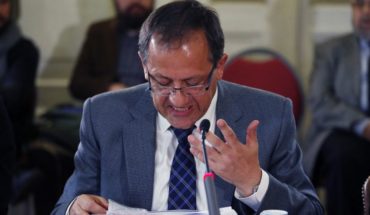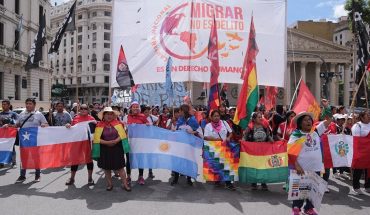In the last 20 years alone, between 2000 and 2020, trade between the region and China increased 26-fold, from $12 billion to $310 billion, according to United Nations figures.
For several South American countries -such as Chile, Peru, Colombia, Brazil and Argentina– China is today an essential partner to which a large part of its exports are directed, such as minerals (including copper) or food (such as soybeans).
For this reason, experts consulted by BBC Mundo agree that Xi Jinping’s friendship with Putin should be closely followed by Latin American nations.
“Given the influence that China has in economic terms in Latin America, and especially in South America, they must take this situation into account and think about how support for one country or another could affect them,” he says. Margaret Myer, director of the Asia & Latin America department at the Inter-American Dialogue think tank.
“I think it’s part of the reasons why Brazil hasn’t strongly criticized what’s happening with the war in Ukraine,” he adds.
For Pamela Aróstica, director of the “China and Latin America Network: Multidisciplinary Approaches (Redcaem)”, from the region it cannot be ignored that the Russian invasion of Ukraine is happening in a context of US-China trade war which, in his opinion, is “much deeper”.
“They are in a competition over who will be the superpower in the next few years. And that’s why it’s so important for China to have an Eastern bloc. It needs allies of the caliber of countries like Russia and entire regions like Latin America,” he says.
The doctor in Political Science adds that “the time of subtleties has passed, now it is much more frontal. Are we friends or not? Are they with me or not?… That is why many Latin American countries have maintained an ambivalent attitude for fear of the consequences.”
Aróstica says that the economic crisis that hits many Latin American nations and China’s role as a source of loans.
“Countries have to weigh making China angry and the implications that this may have when they want to access, for example, a loan.”
A similar look has John Griffiths, Head of Security and Defense Studies at the AthenaLab Foundation, a Chilean think tank focused on International Affairs, Security and Defense.
“In the strategic sphere, every Latin American country must consider its relationship with China to carry out its foreign relations policy. And there are some interests that have made several nations in the region not condemn more emphatically Russia’s aggression against Ukraine,” he said.
2. Trade and political relationship with Russia
While direct trade ties between Russia and Latin America are not so widespread – it represents, for example, only the 0.6% of the region’s exports-, yes there are some countries and sectors that may suffer a greater impact in case of breaking relations with Moscow.
Butter, salmon, cheese and fruits such as apples, bananas and pears, which are produced in places like Paraguay, Chile, Argentina, Ecuador, Brazil and Colombia, have Russia as one of their main destinations.
As for imports, while Moscow also has a low overall share of the continent, it sends some strategic products for production. This is the case of the Fertilizers that for agricultural producers such as Argentina and Brazil are key.
Last year, in fact, Putin assured the then Brazilian president Jair Bolsonaro that Russia was “committed” to ensuring “uninterrupted supply” of fertilizers.
Brazil imports more than 80% of the fertilizers it uses and Russia is its main supplier.
According to the Economic Commission for Latin America and the Caribbean (ECLAC), Russia is also an “important supplier of certain key inputs in the production of catalytic converters and semiconductors,” so the shortage could put more pressure on the region’s automotive sector, which already faces supply constraints.
But beyond the strictly economic and commercial, the truth is that Russia also has long-standing political relations in the region that are not easy to break.
A small but relevant group of Latin American countries has shown their direct and open sympathy with Russia’s position in the conflict. Venezuela is one of them, since it has in Russia to one of its central pillars of political and military support. Cuba, Nicaragua and Bolivia they have also expressed their support for Putin in opposition to the United States.
On the other hand, it is important to note that the war in Ukraine coincides with the arrival of a new wave of leftist presidents in Latin America, supported by coalitions that have historically had an affinity with the then Soviet Union.
Since 2018, the presidency of Mexico, Argentina, Bolivia, Peru, Honduras, Chile, Colombia and Brazil has been occupied by these leaders.
“Many of them have historically been aligned with Russia. So it is not so easy for governments to say that they are in favor of Ukraine,” explains Pamela Aróstica.
For his part, the academic expert on Latin American issues at the Ca’ Foscari University Venice, Luis Beneduzi, he tells BBC Mundo that “for many leaders to be with Ukraine is to be with the United States.”
“The history of US imperialism is very important when thinking about the reaction of these countries that today are experiencing a progressive change,” he adds.
The case of Gabriel Boric, in Chile, is perhaps the one who breaks the rule, because from the beginning he has been categorical in condemning Putin for the invasion. But, according to experts consulted by BBC Mundo, the rest have shown weak signs of support.
Lula da Silva, for example, is now offering himself as a peace mediator. However, according to international analysts, his stance could end up favoring Moscow.
“Mediation attempts are likely to favor Russia. Ukraine needs to fight to free its citizens. Moscow can accept a ceasefire to ‘freeze’ the front line and maintain control of the occupied territories, while waiting to gain enough strength and confidence to move forward,” he told him. Keir Giles, Senior advisor of the Russia and Eurasia Program at Chatam House, to BBC Brazil.
Thus, as much as many insist on calling Latin America the “backyard” of the United States, the truth is that the multiplicity of positions of these nations in the face of the Russian invasion of Ukraine shows that Moscow still arouses sympathy on the continent.
3. Ties with the United States and the West
But for Latin America it is not so easy to turn its back on Ukraine, strongly supported by The United States and the West.
There are commercial, political and military ties with these blocs that are deep and long-standing.
In commercial terms, for example, the 42% of the region’s total exports (equivalent to 8.5% of regional GDP) is destined for the United States, surpassing even China.
While, according to ECLAC, the European Union attracts 9% of exports, and only in 2022 it increased by 26% over the previous year.
The main trading partners of the United States are Mexico Brazil, Chile, Colombia and Peru.
Mexico is especially important in this scenario because by sharing a border of more than 3,000 kilometers with the United States, it has a link that extends far beyond diplomatic and official relations.
Not only are they strategic trading partners – according to the US State Department, in 2021 trade in goods and services between the two countries exceeded US$720.000 Million, making Mexico the second largest trading partner of the United States – but they also have to deal with such complex issues as migration and security cooperation.
Although the president Andrés Manuel López Obrador (AMLO) He did not bow to pressure from Ukraine to impose economic and political sanctions on Russia – nor did he want to send weapons to Kyiv – he did vote in favour of the UN resolution calling on Russia to end hostility towards Ukraine last February.
In this way, AMLO has juggled to try to remain as neutral as possible, arguing that his country is for the “Peace and dialogue”.
On the other hand, an important element that several Latin American countries have to take into account when analyzing their support for Ukraine is its strong relationship from the military point of view with the West.
This is explained to BBC Mundo by the political scientist and expert in international relationsPaulina Astroza.
“There is an important part of Latin American countries that will always accompany the United States for a security issue. This is the case of Colombia or many Central American countries that depend on a thousanditarly from the United States,” he says.
A similar opinion has John Griffiths.
“The Chilean Air Force, for example, depends on its alliance with the United States, on its fleet of F16 fighters. The Chilean Navy is also highly dependent on the West, and the Army has the armored fleet, which is German. In Peru, Brazil and Colombia it is more or less similar. Colombia has a decades-long relationship with the United States and not because it exists todayto An ideologically dominant government Left That’s gone.” Says.
The experts consulted by BBC Mundo agree that, despite the strong bond that several Latin American nations have with the West, Ukraine and the leaders who support it – such as Joe Biden – are still waiting for a greater signal of support from the region.
And that pressure, they add, will only continue to increase as long as the war does not end.
4. Internal backup
There is another important element that Latin American countries must evaluate when supporting Russia or Ukraine: what their own citizens think about the war.
At this point, it is key to keep in mind that for many Latin Americans this is a distant conflict, he explains. Juan Pablo Toro, senior fellow at the Royal United Service Institute (RUSI), a UK-based institution that brings together defence and security experts.
“Given the security crisis in Latin America, people wonder why they are going to go to war thousands of miles away if they can’t go out on the street because the narcos are there. In security issues, the priority starts with the internal one, “he says.
Thus, he explains, There is more incentive to take a neutral position on conflict.
“Telling people that what is at stake here is legality, sovereignty and a rules-based international system is very difficult. Because nobody knows what is going to happen and in the end supporting Ukraine is buying an enemy that, in addition, is a friend of China, “says Toro, who is also executive director of AthenaLab.
On the other hand, Latin American governments – many of them left-wing – have come under pressure from their own political coalitions.
This is the case of Boric, who came to power at the hands of the Chilean Communist Party (PC). At the time of the invasion, in February 2022, this party condemned Russia but also the United States and the North Atlantic Treaty Organization (NATO) for their “expansionist efforts” that, they said, “opened danger of war.”
In addition, they opposed the Ukrainian leader to speak before the Chilean parliament, and, in fact, were not present at the intervention held on Tuesday.
“Boric’s decision to support Ukraine so sharply has brought him costs and bullying on behalf of his own coalition,” he says. Paz Zarate, Chilean lawyer specializing in public international law.
“Boric has made a personal commitment to human rights, no matter the country. Maybe he doesn’t feel, as other Latin American presidents do, an identification with Soviet times,” he adds.
More than a year after the Russian invasion of Ukraine, international analysts agree that every day there will be more pressure for Latin American countries to take a definitive position regarding the war.
Although the neutrality It can be a good ally for several nations in the region, the great powers are eager to show their support in an increasingly polarized world that at times reminds of the Cold War.





